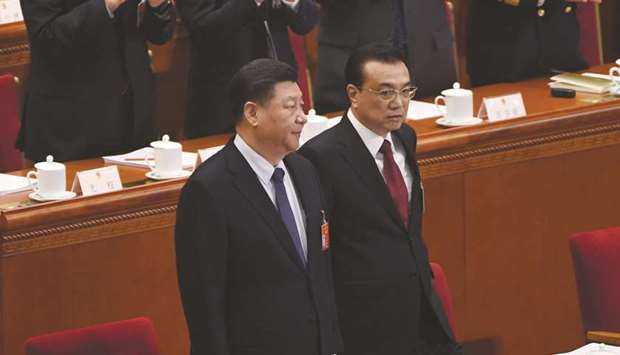Chinese Premier Li Keqiang promised various reforms meant to stimulate China’s economy as he set an economic growth target of 6 to 6.5% for 2019 at the opening of the annual parliamentary session yesterday.
The range would mark China’s slowest economic growth in almost three decades. However, observers see it as optimistic and hard to achieve. Last year, the economy grew 6.6%, bogged down by a trade war with the United States and rising government debt.
Li warned of the “many difficulties” facing the economy as he addressed the 2,948 delegates at the cavernous Great Hall of the People in Beijing.
The parliamentary session, known as the National People’s Congress, will last until March 15. The government work report presented by Li outlined tax cuts meant to stimulate economic growth.
Most importantly, the value-added tax (VAT) in manufacturing and other industries will drop three percentage points to 13%. Enterprise contributions to social insurance schemes will be reduced, and private businesses will have access to better financing, Li said. “The many risks and potential problems that have built up over the years demand stronger mitigating action,” Li said. In a nod to international financial institutions such as the IMF that have warned of China’s soaring debt, Li said the country must “defuse risks step by step” and “forestall any systemic and regional risks.”
He said the government must avoid pursuing short-term stimuli, such as by pouring money into infrastructure projects, as China did after the 2008 global financial crisis to avoid recession. Speaking of the slowing global economy, Li decried “mounting” protectionism and unilateralism.”Instability and uncertainty are visibly increasing, and externally-generated risks are on the rise,” he said.
Li promised to advance reforms in a series of areas that have been sore spots in China’s months-long trade war with the US. Chinese and US teams have indicated they are nearing a resolution in the conflict, which saw Washington slap tariffs on 250 billion dollars’ worth of Chinese imports.
Washington wants Beijing to eliminate its support for key areas of the tech sector and state-owned enterprises, as well as lower tariffs and improve the protection of intellectual property rights. Solving the US-China trade conflict will be essential to the government reaching its growth target, said independent economics analyst Hu Xingdou.
Currently, the government is shoring up economic growth through investment, but the focus needs to switch to creating a favourable environment for private businesses, he said. “Whether the target is achieved depends on whether structural reform can be achieved,” said analyst Wu Qiang. “Government debt is already extremely high, therefore public investment has reached a bottleneck. This year’s economic growth will solely rely on private business owners and consumers.”
Some observers think the growth target is too optimistic anyway. “The target might be very difficult to achieve,” said economics analyst Zhang Ming. “But if the government set a lower target, it would definitely have had a negative effect on the whole country’s confidence.”
This is a politically sensitive year for the Communist Party, marking the anniversaries of several episodes of unrest, including 60 years since the Tibetan uprising against Chinese rule, 30 years since the Tiananmen Square protests, and 10 years since deadly ethnic riots in the western city of Urumqi.
In his address, Li promised to open up the economy, ease some bureaucratic hoops and upgrade traditional industries. Chinese and foreign companies will be “treated as equals,” Li said, acknowledging complaints from US and European businesses that China favours domestic firms. As for the national defence budget, it is set to grow by 7.5% this year, below last year’s growth rate of 8.1%.
Li warned that China will “resolutely oppose and deter any separatist schemes or activities seeking ‘Taiwan independence.’” China’s defence budget has grown steadily in the past few years, as the country seeks to modernise its military, expand its footprint in disputed territories in the South China Sea, and build new army bases abroad.

China’s President Xi Jinping (left) and Premier Li Keqiang are applauded as they arrive for the opening session of the National People’s Congress (NPC) at the Great Hall of the People in Beijing yesterday.
